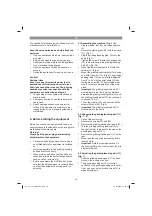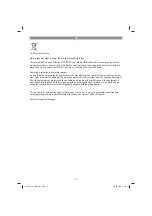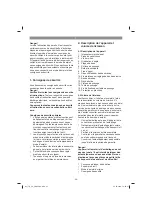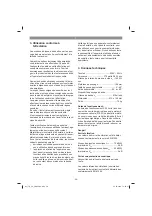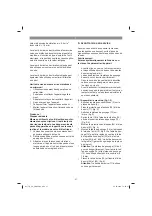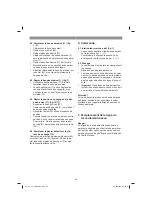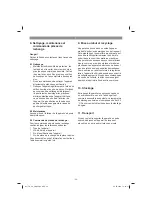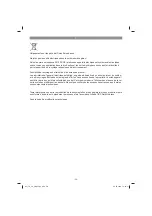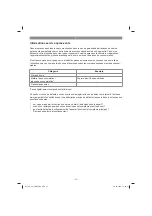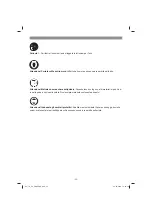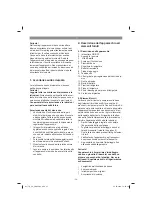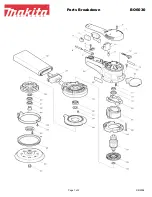
GB
- 19 -
5.4. Moving the grinding/sanding position of
the grinding/sanding belt (11) (Fig. 10/11)
•
Slacken the two nuts (29).
•
Move the grinding/sanding belt (11) upwards
into the desired position.
•
Retighten the nuts (29) to secure this position.
•
In this position you can use the grinding/
sanding table to support the workpiece. To do
so, push the table into the hole in the holding
tube (31) and secure with the screw (30).
5.5. Replacing the abrasive paper on the grin-
ding/sanding disk (13)
Dismantle the bottom wheel guard (20) by remo-
ving the 3 screws (21) (Figure 4). Pull the san-
ding/grinding paper o
ff
the sanding/grinding disk
(13) and attach the new sanding/grinding paper
(quick-
fi
t fastening system).
6. Operation
6.1. On/O
ff
switch (Fig. 1)
•
The grinder/sander can be switched on by
pressing the green button „1“ (1).
•
To switch off the grinder/sander you must
press the red button „0“ (1).
6.2. Grinding/sanding
•
Always hold the workpiece firmly during grin-
ding/sanding.
•
Do not exert excessive pressure.
•
To prevent the abrasive paper from becoming
worn on one side, the workpiece should be
moved to and fro on the grinding/sanding belt
or grinding/sanding plate as you grind/sand.
•
Important!
Pieces of wood should always
be sanded with the grain to prevent them
splitting.
Important.
If the grinding wheel or the grinding/sanding belt
becomes jammed during operation, please re-
move the workpiece until the tool reaches its top
speed again.
7. Replacing the power cable
Danger!
If the power cable for this equipment is damaged,
it must be replaced by the manufacturer or its
after-sales service or similarly trained personnel
to avoid danger.
8. Cleaning, maintenance and
ordering of spare parts
Danger!
Always pull out the mains power plug before star-
ting any cleaning work.
8.1 Cleaning
•
Keep all safety devices, air vents and the
motor housing free of dirt and dust as far as
possible. Wipe the equipment with a clean
cloth or blow it with compressed air at low
pressure.
•
We recommend that you clean the device
immediately each time you have finished
using it.
•
Clean the equipment regularly with a moist
cloth and some soft soap. Do not use
cleaning agents or solvents; these could at-
tack the plastic parts of the equipment. Ensu-
re that no water can seep into the device. The
ingress of water into an electric tool increases
the risk of an electric shock.
8.2 Maintenance
There are no parts inside the equipment which
require additional maintenance.
8.3 Ordering replacement parts:
Please quote the following data when ordering
replacement parts:
•
Type of machine
•
Article number of the machine
•
Identification number of the machine
•
Replacement part number of the part required
For our latest prices and information please go to
www.isc-gmbh.info
Anl_TC_US_400_SPK9.indb 19
Anl_TC_US_400_SPK9.indb 19
24.07.2018 13:53:56
24.07.2018 13:53:56














